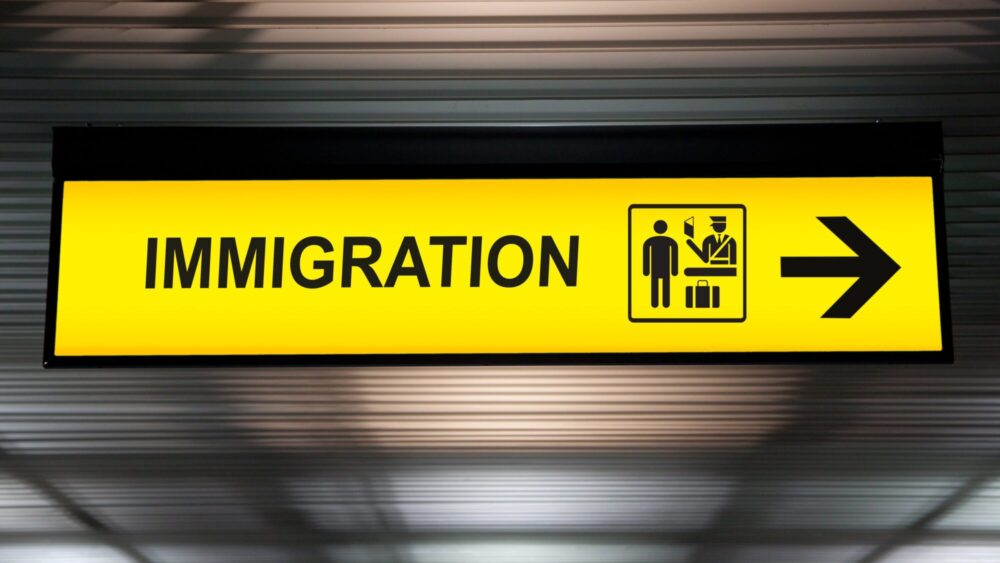
Photo: Shutterstock
At a time when France has once again been hit by Islamist terrorism, the National Assembly is—once again—considering the reform of French immigration policy which has been postponed several times. The government intends to use the opportunity to harden its stance.
A bill to overhaul France’s immigration policy has been on the agenda of MPs for several months. The murder of Professor Dominique Bernard in Arras on Friday, October 13th, highlighted a series of failings on the part of the French administration in the treatment of the murderer, Chechen refugee Mohammed Mogushkov, who should have been deported a long time ago. The new law, says Interior Minister Gérald Darmanin, is designed to prevent such situations from recurring: “We must continue to work harder, more firmly.”
Darmanin’s aim is to obtain “the systematic expulsion of any foreigner considered to be dangerous.” He says he is considering a provision to withdraw the residence permit of anyone who “adheres to a radical jihadist ideology.” The ministry gives a concrete example in the case of a person who has “a photo of an Islamic State beheading on their mobile phone.” With this component, “We could withdraw a residence permit if we have no other reason to do so” in the event someone becomes radicalised.
While the stated ambition is appealing, in reality it is nothing new, as measures of this type already exist in current French law—the famous OQTF (Obligation de Quitter le Territoire Français)—which are not applied or are poorly applied. The same promise was made by Darmanin in 2022—without success.
En 2022, la même promesse d’expulsion avait été faite par Darmanin. Jamais tenue. pic.twitter.com/LL0VrtXmQe
— Philippe Murer 🇫🇷 (@PhilippeMurer) October 16, 2023
The Interior Minister’s firm stance is also evident on the issue of the expulsion of certain radicalised foreign nationals, mainly from the Russian republics of the Caucasus. According to Le Monde, quoting Gérald Darmanin, there are currently sixty Russians on the list of radicalised people, who are active on the ‘S’ list, dangerous, and whose residence permits have been withdrawn. Of these, forty are in prison, nine are the subject of legal proceedings, and eleven could be deported, although it is not known whether any members of the family of the Arras attacker are among them.
France has reportedly been in contact with Russia since the beginning of October to try to obtain consular passes, which are necessary for the expulsion procedure. Gérald Darmanin says he wants to override the condemnation of the European Court of Human Rights, which opposes these expulsions. “I take responsibility,” he declared the day after the attack in Arras.
The right-wing parties believe that the draft presented by the government, even with its latest arrangements, falls far short of what is needed. The centre-right Les Républicains party is opposed to the ‘regularisation’ of undocumented workers in so-called ‘high-pressure’ professions, i.e., professions with a shortage of French candidates. They are still threatening Macron’s party with a motion of censure if the immigration law is imposed, using Article 49.3 of the Constitution, like the pension reform. Their alternative proposal is a constitutional amendment, which they will be submitting on December 12th, and which would extend the referendum to migration policy, allow for derogations from the primacy of treaties and European law, reinstate the offence of illegal residence, and enshrine ‘assimilation’ in the Constitution—provisions that have long been essentially defended by the Rassemblement National (RN), who has called the government “powerless.”
The political pressure on the presidential camp is high, with the RN soaring to the top of the polls for the next European elections in June 2024. The party, led by Jordan Bardella, who heads the list for this election after finishing at 23.4% in the previous European elections, is now steadily increasing its lead over Emmanuel Macron’s Renaissance party by more than 8% . Neither of the RN’s rivals on the Right: the Les Républicains party, whose list leader is currently unknown, nor the Reconquête party, which will be represented by Marion Maréchal, are expected to break the 10% barrier. The Rassemblement National is undeniably benefiting from the troubled context of the Israeli-Palestinian war and the ensuing violence, which is being imported into France.
The immigration bill, which is still being drafted, should be submitted to the senators in November and then to the deputies in December.
